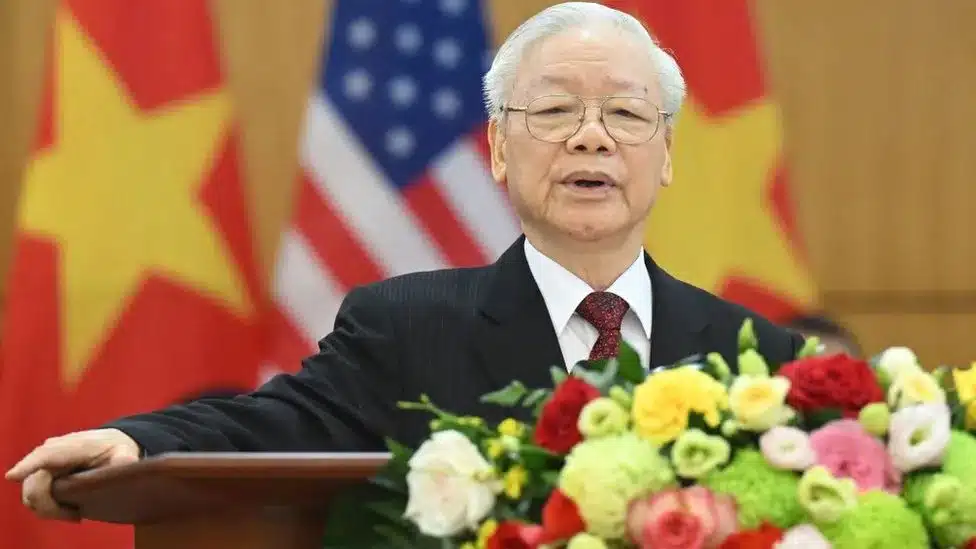Nigeria News
Vietnamese Billionaire Truong My Lan Sentenced To death For $44bn Fraud
Truong My Lan, a 67-year-old Vietnamese property developer, has been sentenced to death for orchestrating one of the most colossal bank frauds in history.
The trial, unfolding in the colonial-era courthouse of Ho Chi Minh City, marks a rare and severe verdict for white-collar crime in Vietnam, particularly involving a female defendant.
Over an 11-year period, Lan was found guilty of siphoning a staggering $44 billion from the Saigon Commercial Bank, a sum that nearly eclipses 9.36% of Vietnam’s GDP for 2024. The court has ordered her to repay $27 billion, an amount that officials speculate might never be fully recovered.
The case has not only highlighted the vast scale of financial manipulation but also shone a light on the Vietnamese communist regime’s often opaque operations.
The authorities, usually reticent about legal proceedings, disclosed extensive details of the case, indicating the gravity of Lan’s crimes. With 2,700 witnesses, 10 state prosecutors, and around 200 lawyers, the trial was an unprecedented legal endeavour in the country.
David Brown, a retired US State Department official with extensive experience in Vietnam, remarked on the trial’s unprecedented nature in the communist era, underscoring its massive scale and public spectacle.


This trial is the latest, most dramatic effort in the “Blazing Furnaces” anti-corruption campaign spearheaded by Communist Party Secretary-General, Nguyen Phu Trong, whose administration has been marked by a hardline stance against corruption.
Truong My Lan, hailing from a prominent Sino-Vietnamese family, rose from humble beginnings as a market stall vendor to become a leading figure in Ho Chi Minh City’s real estate sector.
Her business acumen and connections facilitated the merger of three smaller banks into the larger Saigon Commercial Bank, a move that prosecutors claim was the starting point of her fraudulent activities. Allegations suggest she controlled over 90% of the bank’s shares through proxies and shell companies, leveraging this influence to embezzle funds through hundreds of loans.
The revelations about the extent of her financial manipulations are shocking. Prosecutors disclosed that from February 2019, Lan ordered her driver to withdraw approximately 108 trillion Vietnamese dong (over $4 billion) in cash and store it in her basement, an amount that would weigh around two tonnes.


Truong My Lan has been sentenced to death by lethal injection over a $44bn fraud scams


The 67-year-old has been told she will have to refund $27 billion
The trial has exposed not only the mechanics of Lan’s fraudulent empire but also the systemic corruption and complicity within the Vietnamese banking and political sectors. Critics, like Le Hong Hiep of the ISEAS – Yusof Ishak Institute, point to the open secret of Lan’s financial dealings and question the broader institutional failures that allowed such fraud to persist.
The case against Lan and her accomplices also illuminates the power struggles within the Vietnamese Communist Party. Secretary-General Nguyen Phu Trong’s aggressive anti-corruption drive reflects an attempt to consolidate power and reassert control over the economically vibrant but politically restive south, particularly Ho Chi Minh City.
Trong’s tenure has been marked by a paradoxical blend of economic liberalization and stringent political control, aiming to elevate Vietnam to affluent nation status by 2045 while curbing the corruption that has fueled its economic engine.
Truong My Lan’s trial and the extensive coverage it received suggest a turning point in Vietnam’s handling of high-profile corruption cases. The public display of accountability and legal process, rare in the communist nation’s history, signifies a potential shift in the government’s approach to corruption and governance.
As Vietnam navigates its path towards economic growth and political stability, the legacy of this trial will likely resonate, influencing both public perception and policy direction in the years to come.
© 2024 Naija News, a division of Polance Media Inc.









